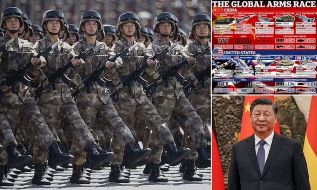Apple Berniat Investasi US$45 Juta di Indonesia, Tembus Kendala TKDN
Indonesian Nationalism Takes a Bite Out of Apple
Editor : Ismail Gani
Translator : Novita Cahyadi
 b.jpg)
APPLE berupaya untuk mendapatkan kantor perwakilan di Indonesia setelah ketentuan perundang-undangan menghambat upaya raksasa teknologi AS untuk bersaing di pasar yang tumbuh pesat untuk menghadapi Samsung dan saingan lainnya.
Poinsel pintar iPhone 6S dan 7 yang belum dirilis secara resmi pada negara dengan perekonomian terbesar di Asia Tenggara setelah Apple berupaya untuk memenuhi persyaratan bahwa produsen ponsel harus memiliki 'kandungan lokal' 20 persen untuk ponsel 4G yang dijual di Indonesia sesuai ketentuan Tingkat Komponen Dalam Negeri (TKDN).
Samsung Korea Selatan berhasil memenuhi kewajiban tersebut dan memperluas pangsa pasar di Indonesia - negara berpenduduk 255 juta orang, dengan potensi konsumen muda - lebih 25 kali lebih besar dari Apple.
Peraturan yang mulai berlaku tahun ini bertujuan untuk mendukung pertumbuhan industri manufaktur nasional, yang tertinggal dari negara-negara Asia, dan berencana untuk menaikkan persyaratan kandungan lokal hingga 30 persen pada awal tahun depan.
Namun ketentuan itu pun menuai kritik, disebut sebagai bukti baru dari aturan Indonesia yang menghambat pengembangan bisinis di Indonesia, yang berada pada peringkat 109 menurut indeks kemudahan bisnis yang dilansir Bank Dunia.
Ketentuan baru menyatakan bahwa 'perusahaan-perusahaan dipaksa meninjau kembali rencana pengembangan jaringan pemasaran dan investasi tinggi," kata Sudev Bangah dari International Data Corporation (IDC), perusahaan riset konsumen teknologi kepada AFP.
Apple menghadapi kendala perluasan pasar teknologinya di negara berkembang lainnya, terutama India di mana raksasa teknologi dari Silicon Valley menghadapi hambatan dalam upayanya untuk membuka toko bukan menjual produk melalui pengecer pihak ketiga.
Pemerintah India dikabarkan pada Mei menolak untuk membebaskan Apel dari aturan yang menyatakan pengecer tunggal merek asing harus membeli setidaknya 30 persen dari bagian mereka secara lokal untuk membuka gerai sendiri.
Aturan Konten Lokal
Terkait ketentuan 'kandungan lokal' telah dipenuhi oleh Samsung, karena sudah memiliki pabrik di Indonesia, dan mengembangkan lini perakitan di pabriknya hingga tahap akhir produksi.
Kompetitor lainnya, termasuk Asus, Lenovo, Oppo dan Blackberry - yang telah mendominasi di Indonesia tetapi menghadapi fakta peluang pasarnya telah digerus - juga telah memenuhi kewajiban untuk mematuhi ketentuan pemerintah Indonesia.
Namun para pejabat mengakui bahwa sejauh ini aturan tidak meningkatkan industri manufaktur ponsel di Indonesia seperti yang mereka harapkan. Perusahaan telah memenuhi kewajiban dengan menggandeng vendor lokal untuk memasok suku cadang sederhana seperti kotak, manual dan pengisi daya, tapi komponen hi-tech masih diimpor.
Namun Apple, yang membuat sebagian besar handset di China, belum memenuhi persyaratan. iPhone 6S tidak pernah dirilis di Indonesia sedangkan 7, saat ini sedang diluncurkan secara global, tampaknya tidak mungkin untuk masuk ke pasar Indonesia secara resmi dalam waktu dekat.
Bahkan sebelum aturan baru mulai berlaku, ketentuan lama juga tetap menyulitkan Apple masuk di Indonesia.
iPhone 6 berhasil masuk ke pasar lokal pada awal 2015, tapi itu adalah negara terakhir di dunia di mana model dirilis ketika produsennya kesulitan untuk mendapatkan lisensi impor, menurut sebuah sumber yang dekat dengan masalah ini.
Juru bicara Apple menolak berkomentar ketika dihubungi oleh AFP seperti dilansir MailOnline.
Namun, pejabat Indonesia mendorong skema baru yang kian mengganjal peluang Apple.
"Dengan persyaratan konten lokal, kami berharap industri komponen bisa tumbuh di Indonesia," kata Dini Hanggandari, Kepala Sub Direktorat Industri Peralatan Teknologi Informasi dan Komunikasi, Perkantoran, dan Elektronika Profesional di Kementerian Perindustrian kepada AFP seraya menambahkan bahwa impor smartphone dalam beberapa tahun terakhir kontribusinya negatif terhadap neraca perdagangan Indonesia.
Hambatan Regulasi
Indonesia merupakan pasar menarik bagi para produsen ponsel dan lebih dari 30 juta handset diharapkan dapat dipasarkan tahun ini, menurut IDC, tapi pangsa pasar Apple mendekam di bawah satu persen.
Namun demikian raksasa teknologi AS ini tidak lantas menyerah, yang belum lama ini menjanjikan investasi $45 juta untuk membuka pusat pengembangan aplikasi di beberapa kota di Indonesia dalam upaya untuk memenuhi persyaratan, menurut sebuah proposal yang diajukan kepada pemerintah oleh Apple dan diketahui oleh AFP.
Pada Juli, Kementerian Perindustrian RI mengeluarkan aturan tentang perangkat lunak, seperti aplikasi, harus diklasifikasikan sebagai 'muatan lokal', kata kata Dirjen Industri Logam Mesin Alat Transportasi dan Elektronika Kemenperin, I Gusti Putu Suryawirawan.
Namun rencana tersebut kemudian ditentang, setelah munculnya pertentangan di instansi terkait tentang bagaimana menangani investasi asing.
Hambatan yang mengganjal peluang produsen smartphone asing masuk Indonesia dikemukakan oleh Presiden RI Joko Widodo yang akan mengembangkan potensi Indonesia menjadi negara 'ekonomi digital' terbesar di Asia Tenggara pada 2020, dengan menarik investasi asing di sektor teknologi dan meningkatkan peluang e-commerce.
"Di satu sisi Anda berbicara tentang ekonomi digital, di sisi lain, semua peraturan menghambat peluang investasi mereka," kata John Riady, konglomerat Lippo Group pada sebuah forum baru-baru ini di Jakarta.
APPLE is battling to gain a foothold in Indonesia after nationalistic regulations hit the US tech giant's efforts to compete in the booming emerging market against Samsung and other rivals.
The iPhone 6S and 7 are yet to be released in Southeast Asia's largest economy as Apple struggles to fulfil requirements that phone makers must have 20 percent "local content" for 4G handsets sold in the country.
South Korea's Samsung has been able to meet the demands and gain a share of the market in Indonesia -- a country of 255 million people, with an army of young consumers -- more than 25 times bigger than Apple.
Officials say the regulations that came into force this year are aimed at supporting the growth of the local manufacturing industry, which lags behind its Asian peers, and plan to raise the local content requirement to 30 percent at the start of next year.
But to critics, it is just the latest example of misguided nationalistic rules that hamper rather than help business in Indonesia, which is ranked 109th on the World Bank's ease of doing business index.
The new rules "force companies to rethink the entire supply chain and that is expensive for them to do," Sudev Bangah of International Data Corporation (IDC), a consumer technology market research firm, told AFP.
Apple has encountered problems in other emerging markets, notably India where the Silicon Valley giant is facing roadblocks in its quest to open stores instead of selling products through third-party retailers.
The Indian government reportedly refused in May to exempt Apple from rules stating foreign single-brand retailers must buy at least 30 percent of their parts locally to open their own outlets.
- Local content rules -
In Indonesia meeting the local content rules has been easier for Samsung, as it already had factories in the country, and has added assembly lines to the plants to carry out the final stages of production.
Other competitors, including Asus, Lenovo, Oppo and Blackberry -- which used to dominate in Indonesia but has seen its market share obliterated -- have also taken steps to fulfil the government's demands.
However officials admit that so far the rules are not boosting Indonesia's phone manufacturing industry as they had hoped. Firms have met the demands by getting local vendors to supply simple parts, such as boxes, manuals and chargers, and hi-tech components are still being imported.
But Apple, which makes most of its handsets in China, has not yet met the requirements. Its iPhone 6S was never released in Indonesia while the 7, currently being rolled out globally, seems unlikely to hit the country's shops any time soon.
Even before the new rules came into effect, things were not easy for Apple in Indonesia.
The iPhone 6 made it into the local market in early 2015, but it was the last country in the world where the model was released as the firm had a tough time getting import licences, according to a source close to the matter.
An Apple spokeswoman refused to comment when contacted by AFP.
Still, government officials pushing the new scheme appear unfazed.
"With the local content requirement, we hope the component industry can grow," Dini Hanggandari, an official overseeing communications technology at the industry ministry, told AFP, adding that smartphone imports had in recent years contributed to Indonesia's negative trade balance.
- Throwing up barriers -
Indonesia is attractive for phone makers and more than 30 million handsets are expected to be shipped to the country this year, according to IDC, but Apple's share of the smartphone market has been languishing at under one percent.
Nevertheless the tech giant is not ready to give up, recently pledging an investment of $45 million to open app development centres in several Indonesian cities in a bid to meet the requirements, according to a proposal submitted to the government by Apple and seen by AFP.
In July the industry ministry relaxed the rules to allow software, such as apps, to be classified as "local content", senior official I Gusti Putu Suryawirawan said.
But the plan has met resistance, highlighting divisions within the government over how to deal with foreign investment.
The barriers being thrown up to smartphone makers fly in the face of President Joko Widodo's own avowed aim to transform Indonesia into Southeast Asia's biggest "digital economy" by 2020, by attracting foreign investment in the tech sector and boosting e-commerce.
"On the one hand you talk about the digital economy, on the other hand, all the regulations cancel out those intentions," John Riady of major conglomerate Lippo Group said at a recent forum in Jakarta.















